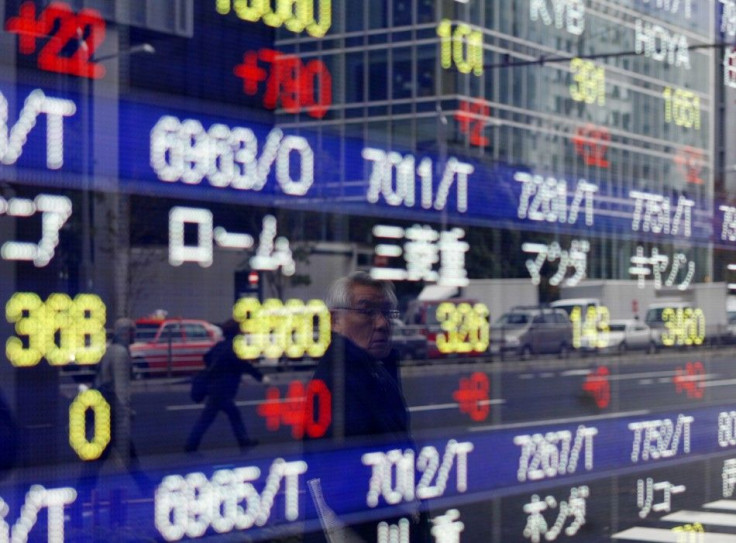Nikkei, Asia Markets Close Lower Friday on Europe Debt Concerns

(Reuters) - Japan's Nikkei share average slipped more than 1 percent on Friday, backing further away from its 25-day moving average as investors fretted over the euro zone debt crisis and weakness in the single currency.
For Japan's market participants, the euro rate as it is now reflects a deep-rooted, pessimistic view of Europe's problems, which remain very uncertain, said Ryota Sakagami, chief strategist of equity research at SMBC Nikko Securities.
The Nikkei fell 1.2 percent to 8,390.35, declining below its 25-day moving average at 8,500, and marking a 0.8 percent loss for the week.
The broader Topix dipped 0.9 percent to 729.60 as participants avoided risk ahead of a three-day weekend, with Japanese markets closed on Monday for a national holiday.
We knew last year that Europe's problems were being pushed back to the beginning of this year and market participants remain worried about Italian and Spanish bond sales next week, said Yutaka Miura, a senior technical analyst at Mizuho Securities. It looks like the Nikkei will be weak for the time being in this environment.
The benchmark remained rangebound before the closely watched U.S. nonfarm payrolls data due at 1330 GMT, with investors seeking further clarity on the state of the U.S. economy.
The euro marked a 16-month low against the greenback and was trading at 98.71 yen on trading platform EBS, near
an 11-year low hit on Thursday.
Shoji Hirakawa, chief strategist at UBS, said the impact of the euro's weakness on Japanese exporters' earnings was relatively small as the region accounts for only 5-10 percent of their total sales and profits, but that it was hurting market sentiment.
In the case of a weaker euro, the stock market will suffer even if the material impact is small, he said.
Cyclicals like shippers lost heavily, with Japan's shipping subindex dropping 3.7 percent.
Continuing its losing streak, Elpida Memory shed 5.4 percent to 331 yen after Deutsche Bank cut its target price to 400 yen from 500 yen, citing a longer earnings recovery due to protracted market weakness and delays in reducing costs.
Meanwhile, Southeast Asian stock markets retreated on Friday as investors became nervous ahead of U.S. job data later in the day but they ended the first week of the year with modest gains.
Non-farm payrolls due later on Friday are expected to show 150,000 jobs were added in December. If the figures come in as expected, near-term market sentiment could tip to positive.
Singapore's stock market ended flat but it posted a 2.6 percent rise for the first week of the year, leading others in the region. The Straits Times Index lost 17 percent last year, Southeast Asia's second-worst performance after Vietnam.
Indonesia fell 0.9 percent on Friday, the Philippines was down 0.8 percent, and Thailand and Malaysia ended flat. Vietnam fell for a fourth session, ending down 1.23 percent.
According to Thomson Reuters StarMine, Singapore is trading at 11.9 times this year's projected earnings, with Vietnam at 8.3 times, Thailand 11, the Philippines 13.3, Malaysia 13.8, Indonesia 13.6 and the whole of Asia at 10.6.
Funds started the year showing good buying interest, taking the view that share prices were cheap compared to corporate profits. In the short term, however, stock prices might tread water due to headwinds in Europe's banking and debt crisis.
Funds seem to have high cash positions because they have underweighted risk assets for a while due to the debt crisis in Europe, said Viwat Techapoonphol, strategist of Tisco Securities in Bangkok.
The downside risk to risk assets and equities is more limited at this point as the worst of the Europe issue might have been largely priced in by markets at this level.
Financial shares were generaly weak, partly due to profit taking, while energy shares outperformed on Friday, supported by the firm global oil market.
Indonesia's PT Bank Rakyat Indonesia Tbk was down 0.7 percent, after a gain of nearly 3 percent in the previous four sessions, while Malaysia's Petronas Chemicals Group Bhd eased 0.8 percent, erasing part of the 2.9 percent gain earlier in the week.
In Bangkok, banking shares edged up 0.4 percent as investors bought back shares sold earlier this week because of
the prospect of higher levies on deposits.
(Additional reporting by Viparat Jantraprap.)
© Copyright Thomson Reuters 2024. All rights reserved.











